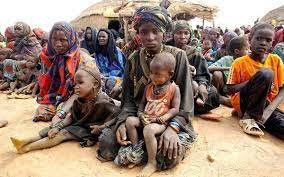About 305,000 Nigerians are refugees in other countries, while over 2.1 million people are Internally Displaced Persons (IDP) camps across the country, an American State Department report has shown.
The report also alleged that those it classified as illicit recruiters, including family members, community members and pastors, are increasingly targeting individuals seeking to travel by air to the Middle East, where wealthy individuals and other actors exploit them in forced labour or commercial sex.
It ranked Abia, Delta, Ebonyi, Edo, Imo, and Kogi states as hotspots for trafficking of victims to West Africa and Europe.
The report said 80 per cent of women in Spain’s unlicensed brothels are victims of sex trafficking with a larger percentage of them coming from Nigeria, while Nigeria trafficking networks forced women and girls into commercial sex around Paris (France), threatening their families in Nigeria to maintain control.
It also said some aid workers, government officials, and security forces often commit sexual exploitation, including sex trafficking, in government-run IDP camps, informal camps, and local communities around Maiduguri, the Borno State capital.
The 644-page report with a foreword by the U.S. Secretary of States, Anthony Blinken, said Nigerian sex traffickers operate in highly organised criminal webs throughout Europe and are known as the “Nigerian mafia” in Italy while many former sex trafficking victims referred to as “madams” begin to work for their traffickers in exchange for leaving sex trafficking themselves.
“While some sex trafficking victims arrive in Europe, believing they will be in commercial sex, traffickers coerce them to stay in commercial sex by altering working conditions and increasing victims’ travel debts. Some victims’ parents encourage them to obey their traffickers and endure exploitation to earn money,” the report said.
The report, dated June 2021, upgraded Nigeria to a Tier 2 status.
It faulted the failure of the National Agency for the Prohibition of Trafficking on Persons (NAPTIP) and other law enforcement agencies in the country to cooperate with each other in curbing trafficking in persons, especially in areas where their mandates overlapped.
![]()










